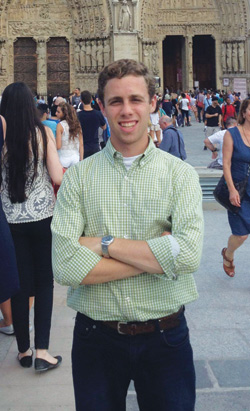Scholar Exhorts Attendees at Harvard Catholic Center Event
 Exercising the constitutional right to "authentic worship" at Harvard was heralded this fall with a lecture from noted scholar Father Peter Stravinskas.
Exercising the constitutional right to "authentic worship" at Harvard was heralded this fall with a lecture from noted scholar Father Peter Stravinskas.The Harvard Catholic Center sponsored the event, entitled "Give Me Freedom (Religious) or Give Me Death."
Stravinskas, editor of The Catholic Answer magazine and books such as The Catholic Response and The Catholic Church and the Bible, exhorted attendees to refute the bifurcation of religious freedom by a secular culture.
Stravinskas spoke about how society is seeking to replace authentic Christian worship and expression with a more politically correct and passive version of religion.
The right to assemble is tolerated, but the freedom to live out your faith with actionable belief and works is disallowed. The elimination of Christmas and Easter from school calendars, the de-recognition of ministries from universities, and the cold shoulder received by many Christians in the academy are all emblematic of the disconnect between religious tolerance and practice.
The difference between religion and true worship is becoming a mile wide in some cultural circles. Rev. Mark Murphy, the Undergraduate Chaplain and Parochial Vicar for Harvard Catholic Center and St. Paul Parish, says such philosophical dichotomy is experienced by students in the very classrooms where independent thought is purportedly encouraged.
"It's taboo to criticize other religions, but it is ok to go against the Catholic faith," said the priest.
According to Jim McGlone, Harvard '15, there is a prejudice against Christianity at Harvard and Christians are looked at as "countercultural."
"Certainly, the moral teaching of the Church has been widely rejected, and many of my peers and classmates view my faith as outmoded or bigoted."
According to McGlone, people begin to have problems when one's faith inspires a broader worldview and informs the way people live.
"Few people would take issue with my decision to go to Mass at St. Paul's," said McGlone, "but when I express my views about the sanctity of human life, the importance of the family to a healthy society, or the nature of virtue and human flourishing, that causes some consternation among many of my peers."
Additionally, McGlone contends that the secular influences of society want to see religion reduced to what takes place within the four walls of a church.
"For this reason," he said, "we must fight for the freedom to keep up a robust practice of the faith, lest the liberty of the Church be reduced to a private affair."
In his lecture, Stravinskas challenged attendees to band together ecumenically and to have the intelligence, conviction, and courage to stand up for authentic religious freedom. He emphasized that the battle isn't only for politicians, intellectuals, and lawyers. Rather, it is a battle of the common Christian who possesses uncommon faith.
Freedom of worship will prevail through the practice of faith by all Christians. And building up the Church will occur by believers keeping their faith alive within their parishes and communities, according to Stravinskas.
Therefore, true freedom of worship will not be relegated to lecture fodder and debate, rather, it will be a legacy of courage and truth that will be lived out for years to come.
"We must pass on the faith to the next generation, constantly working to sanctify ourselves and our communities, and live the Gospel publicly and without fear," said McGlone.





